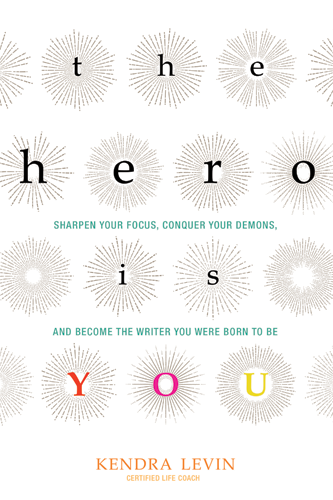Nathan here! Kendra Levin is an Executive Editor at Penguin, a life coach for writers, and the author of the recently-published The Hero Is You, a self-help book for writers on the writing journey out now! Visit her at kendracoaching.com and follow her @kendralevin on Twitter. Enjoy!
When you’re a writer, words are everything. They’re your medium—your paint, your musical notes, your clay. The words of your favorite authors can infuse you with inspiration and motivation, as can clunky text that makes you think, “I know I can do better than that!” The right words can make the difference between a phrase that’s perfectly serviceable and one that lights up the page.
Over the past decade as a senior editor at Penguin and a life coach for writers, I’ve noticed that for all the care writers lavish on the words they write, few spend much time noticing the words they think. For most of us, self-talk is a low-volume radio station running in the background all day long, and we rarely notice the way we’re talking to or addressing ourselves inside our minds (or, if you’re anything like me, sometimes out loud as well).
But a series of studies in recent years have shown that the way we talk to ourselves can have a significant impact on our performance and our well-being. Talk to yourself effectively, and you can reduce your social anxiety, perform better in a high-stress situation, and gain a sense of perspective and self-worth.
Unfortunately, many writers don’t pay much attention to their own self-talk, and when they do, they’re often shocked to discover how harsh they are on themselves on a daily basis. Fortunately, there’s a relatively simple solution: revision.
The next time you hear that background noise in your head, turn up the volume and pay attention to what you’re saying. Then see if your words can benefit from being revised using the following suggestions:
Instead of saying: “I can’t write unless…”
Replace with: “[Your name], today you can…”, as in, “Keisha, today you can write while the kids are at archery practice.”
Instead of saying: “Never”, as in “I’m never going to finish this manuscript” or “This piece is never going to be good.”
Replace with: “[Your name,] when this is finished, you will feel…” as in “Sam, when this script is finished, you will feel a huge sense of accomplishment.”
Instead of: “I don’t know…” as in “I don’t know if this is any good,”
Replace with: “[Your name], you are going to discover _____ and here’s what you’ll get out of that: ________.” As in, “Lupe, you are going to discover whether or not this manuscript is any good by the time you finish it, and here’s what you’ll get out of that: you’ll know what the best is that you can do right now, you’ll set the bar for your next project, you’ll find out whether you can write an entire novel and what that feels like, and by the end you’ll know what you want to do next.”
Instead of: Random insults: “I suck at this,” “I’m a terrible writer,” “I have no business doing this,” “I’m an imposter,” “This chapter is terrible,” “Why bother?”, “I’m wasting my time,” etc.
Replace with: Accurate affirmations: “I’m proud of how hard I’m working.” “Today I feel confident.” “I love the chapters I’ve written so far.” “I’m so proud of these characters and feel lucky I get to tell their story.”
A few general tips for effective self-talk revision:
Use the third person. The subtle separation from the self that’s created by making this shift can make a huge difference in reducing fear and giving us perspective.
Affirmations aren’t B.S. Self-affirmations have been proven to help us filter out unhelpful self-criticism and focus on our strengths.
Treat yourself like you would your best friend. Be compassionate, honest, non-judgmental, and ultimately kind in the way you talk to yourself. And remember that the words you use make a huge difference!




This is really great advice! Thank you!
Lots of good advice! I do this sometimes in the mirror when I have a particularly busy day ahead or have to tackle an item on my to-do list that I'm not looking forward to. Self pep talks can be surprisingly effective.
Excellent advice, I'm excellent at putting myself down and telling myself off for not doing enough so maybe I'll give this a try 🙂
Your advice is exemplary.
I personally believe that talking to yourself could be a lot of help most specially when you are out of words, it is another way of rehearsing, practicing from within before writing it down in a paper.
Another is drawing positive attitude means you get to accomplish something that will begin in yourself.
Hi!
I’m Jo – artist, writer, traveller, wild west nut intrigued by science, and renaissance soul. I’ve recovered from thirty years of depression – a medication crisis was the catalyst, I’ve never felt this good – and I’m chronicling the rebuild of my polymath creative lifestyle on my blog Creating My Odyssey.
I’m hoping to reach people with mental health issues, and creatives in general to give encouragement, inspiration and hopefully some enjoyment.
I’ve also been writing a humongous novel forever, on and off, particularly during young parenthood, to help keep me sane. It’s a beginning, muddle and end called Alias Jeannie Delaney and it’s the life story of a devastating cowgirl who’s the fastest gun in the west and also bisexual. Since my recovery from depression I’ve decided it’s time to get it out there! I’m blogging about it on my site.
Thank you for reading. If you feel like dropping in that would be
brilliant!
Jo UK
http://www.jo-b-creative.blogspot.co.uk
(My new website, but I've only just started using it.)
http://www.joclutton.simplesite.com
(My old one. Most of my old stuff is still there)
http://www.kitty-le-roy.co.uk (wild west website)
Facebook Jo Bennett
Twitter @Clutton_jo